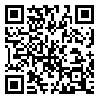BibTeX | RIS | EndNote | Medlars | ProCite | Reference Manager | RefWorks
Send citation to:
URL: http://ijpcp.iums.ac.ir/article-1-1510-en.html
2- Tehran University of Medical Sciences
Objectives: The purpose of this study was to compare the effectiveness of cognitive-behavioral group therapy and exposure therapy on the reduction of interpretation bias and fear of negative evaluation in social anxiety disorder. Method: In a pre-posttest experimental design with control group, 24 students studying at B.Sc. level in the Health School of Iran University of Medical Sciences with the diagnosis of social anxiety disorder were selected by convenience sampling. Then, all of the subjects were randomly allocated into three groups (cognitive-behavioral group therapy, exposure therapy, and waiting list control group). Twelve sessions of cognitive-behavioral group therapy and exposure therapy were carried out according to a standard manual of therapy, and the waiting list control group did not receive any treatment. Data were gathered through administration of Social Phobia Inventory (SPIN), Interpretation Questionnaire- Revised, and Brief Fear of Negative Evaluation Scale (BFNE-S). Univariate analysis of covariance was used for data analysis. Results: The cognitive-behavioral group therapy comparing to the exposure therapy (p<0.01) and the waiting list control group (p<0.001) significantly led to the reduction of interpretation bias in the socially anxious subjects. It was also found that exposure therapy alone did not significantly reduce interpretation bias in the social anxiety patients and showed no difference with the waiting list control group. On the other hand, both cognitive-behavioral group therapy and exposure therapy in comparison with the waiting list control group significantly reduced fear of negative evaluation (p<0.001 & p<0.001 respectively), but there was no significant difference between these groups themselves. Conclusion: Both cognitive- behavioral group therapy and exposure therapy, reduced fear of negative evaluation in social anxiety disorder. On the other hand, the cognitive-behavioral group therapy also reduced interpretation bias, but the exposure therapy could not do so.
Received: 2012/07/9 | Published: 2012/07/15
| Rights and permissions | |
 |
This work is licensed under a Creative Commons Attribution-NonCommercial 4.0 International License. |



